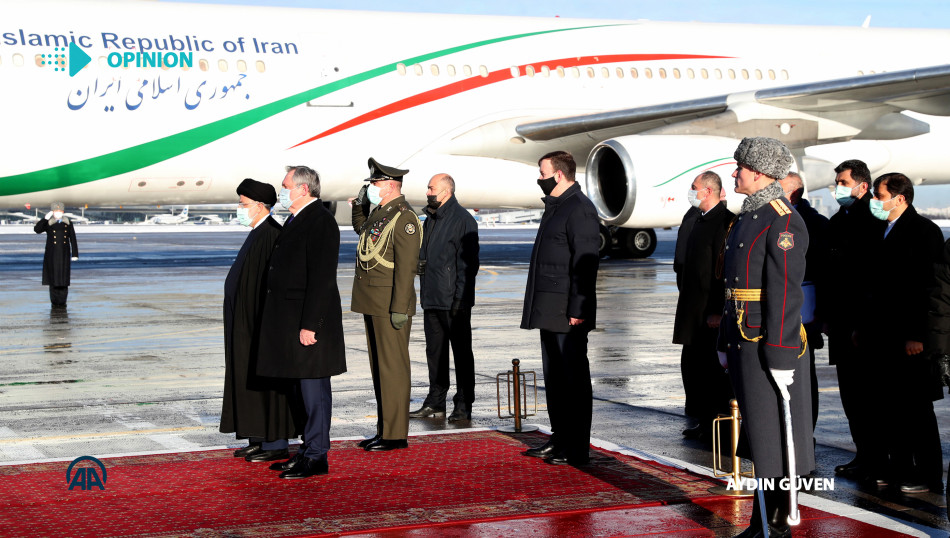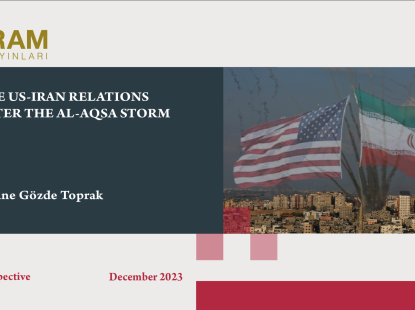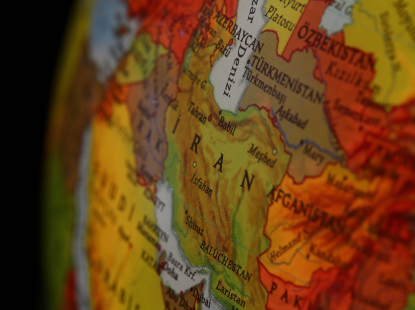Raisi's Visit to Russia and the Criticism He Received
Iranian President Ebrahim Raisi traveled to Russia for a two-day visit with his accompanying delegation on Wednesday, January 19, at the invitation of Russian President Vladimir Putin. During his visit, which took place at a time when nuclear negotiations were underway in Vienna, Raisi met with his Russian counterpart Putin, Iranians living in Russia, Russian economic actors and businessmen, and the Chairman of the Muslim Council of Russia. He also gave speeches at the Russian State Duma, the lower house of the Russian Parliament, and at Moscow National University. Since this visit was the first face-to-face meeting between the two leaders, it was highly regarded by Iran. As a matter of fact, after the visit came to the agenda, various statements were made by Iranian diplomats regarding the content of the visit, and it was stated that the visit would be a milestone in the relations between the two countries.
Raisi first met with his counterpart, Putin, in Russia. During the meeting, it was announced that issues related to bilateral relations, current regional and international issues, as well as the implementation of the Iranian Nuclear Deal, were discussed. Putin, considering the trade relations during the meeting, noted that there has been a significant increase in the volume of trade between the countries in recent years, as well as highlighting the bilateral trade expansion by more than 38 percent last year. On the other hand, Putin's remark on the issue of Iran's membership in the Shanghai Cooperation Organization (SCO) was noteworthy during the meeting. Because, despite the fact that the Chief of the SCO recognized Iran to be a full member at the 21st SCO Summit on September 16-17, 2021, in Dushanbe, Tajikistan's capital, Putin highlighted that Iran is an observer member of the SCO in his meeting with the Chief. The release of this statement on the Russian Presidency's official website became one of the pieces of evidence on escalating tensions between Iran and Russia, which Iran persistently has attempted to conceal.
On the other hand, Raisi stated during the meeting that the cooperation between the two countries is at reasonable levels and that it should be further increased. Noting that they want to develop cooperation in every field in order to raise the relations with Russia to the level of strategic partnership, Raisi stated that they have no restrictions on developing and expanding ties with Russia. By saying this ties’ level should be strategic, Raisi referred to the 20-year comprehensive cooperation agreement between the two countries, which has been on the agenda by the Iranians for a long time. Pointing out Iran's willingness to cooperate with Russia, Raisi also stated that the common understanding of the two countries on regional and international challenges serves as the foundation for their cooperative collaboration, adding, "Iran-Russia relations are on the path of strategic relations". In addition, in his speech to the State Duma on January 20, he noted that Iran and Russia had a common fate in the context of US sanctions. Moreover, mentioning the Vienna negotiations, he stated that nuclear weapons have no place in the Iranian defense strategy, referring to the fatwa of the Supreme Leader.

The issue of the 20-year agreement was also on the agenda at the meeting between foreign ministers of the two countries. In the statement made by the Russian Ministry of Foreign Affairs regarding the meeting of Hossein Amir-Abdollahian and Sergey Lavrov, no information was given about the roadmap of the agreement. However, according to the statement made by Iran, the need to finalize the roadmap, which was on the agenda during the meeting between Raisi and Putin, was mentioned. In this regard, it was noteworthy that although Iranian constantly brought it up, Russia did not refer to agreements or draft documents in official statements. It is possible to interpret this situation as an effort to show that Iran's “Look to the East” policy has been successfully implemented during the process that the Vienna talks are continuing and that it is not alone against the West. Because, within the scope of his visit to China on January 14, 2022, Amir-Abdollahian declared that the Iran-China 25-Year Comprehensive Cooperation Agreement, whose roadmap was signed in March 2021, has been put into effect, and that a similar process has begun with Russi, with a 20-year agreement. However, while Russia did not mention the alleged agreements were signed within the scope of the visit, Iranian Finance Minister Ehsan Khanduzi, accompanying the Raisi, told reporters in Moscow that many important economic agreements were signed between the two countries. Iranian Oil Minister Javad Owji also proclaimed on January 20 that the two countries agreed on several projects in the energy sector. However, it should be noted that despite the optimistic statements made by Iran, which plans to consolidate and institutionalize its regional relations through long-term agreements, no agreement has been signed publicly.
Criticism From Iran Regarding Raisi's Look to the East Policy
Raisi and his supporters consider the steps towards the East as a strategic achievement for the country's foreign policy, while the opponents raise criticism towards the possibility of dependence of Iran on Moscow and Beijing. Raisi's rhetoric and the strategic partnership initiative with Russia (as with China), which has long been advocated by the Iranian conservatives, and the related Look to the East policy, sparked intense criticism and controversy in Iran. The reformist wing, which argues that Iran should not trust and become so dependent on China and Russia, describes Russia as a country that benefits from sanctions against Tehran and from Iran-West tensions in the form of preferential trade agreements. In particular, referring to the historical tensions between the two countries, it is argued that Russia should not be trusted in nuclear negotiations either. Believing that Iran should negotiate directly with the United States, rather than allowing the mediators such as Russia, they assert that Russia does not want anything that would be in Iranian interests. Given that they are well aware that Russia and China, as permanent members of the United Nations Security Council, have previously refused to veto UN sanctions decisions against Iran's nuclear program, they argue that excessive reliance on these countries is not a positive development in terms of Iranian national security, and the number of similar criticisms is increasing day by day. In this context, the demands are that while the Look to the East policy was maintained during the Hassan Rouhani Era, the predecessor of the Raisi, relations with Western countries were also tried to be developed, that Iran was prevented from becoming dependent on any side, and that this should be continued during the Raisi tenure as well.
Another claim of those who criticize the growing dependence on Russia is that the Western countries have the power to put pressure on Russia and China under the name of sanctions, especially when it comes to Iran. In this regard, it is believed that the two countries will not support Iran when it comes to their national interests, as in the past. Because of these concerns, there has also been some rhetoric that establishing a Look to the East policy as a goal will not be in Iran's interests, either on a strategic or economic level, in the long run. It is also said that the important agreements signed by the Raisi government, and the multinational organizations that Iran has been a member of since Raisi assumed office are the achievements of the Rouhani Era. Therefore, there is a growing criticism that these achievements should not be pretended as successes of the Raisi government. To exemplify, firstly; it is stated that the obstacles related to SCO membership were removed during the Rouhani government, but the membership was realized during the Raisi period, secondly; the Iran-China 25-Year Comprehensive Cooperation Agreement signed with China was significantly improved during the visit of Chinese President Xi Jinping to Iran in 2016. For this reason, it is stated that these developments, which are seen as diplomatic successes by the Raisi government, are the product of Rouhani and previous periods.

The meeting between Raisi and Putin has led to significant criticism by Iranian opponent groups due to the building where the meeting was held, the atmosphere of the hall and the attitudes of Putin during the meeting. The meeting was held in a hall where only translators were present and the distance was quite large, citing the coronavirus measures. The fact that the photos taken during the meeting were trending on social media by comparing them with the photos taken during the previous visit by Rouhani and the candid photos during the meeting with Israeli Prime Minister Naftali Benet in Moscow a few months ago also shows the extent of the criticism. Furthermore, the absence of flags of the two countries in the meeting room during the meeting also drew attention. While keeping the distance was explained for health reasons, it is thought that the absence of the flags of the two countries in the meeting room was something deliberately set up. Besides, Putin's aforementioned attitudes have raised thoughts that there are unspoken severe problems in the relations between the two countries. Because although the Iranian Parliament Speaker Mohammad Bagher Ghalibaf stated that he would meet with Putin during his visit to Russia in May 2020, Putin's refusal to meet him also fueled speculation that the tension between the countries came to light (although he accepted to take two COVID-19 tests, one in Iran and the other in Russia, for his meeting with Putin).
On the other hand, it was announced that a military exercise called "2022 Marine Security Belt" started in the Indian Ocean between Iran, China and Russia simultaneous with the meetings were continuing within the scope of Raisi’s visit to Russia. This exercise drew attention as it was the third military exercise between the three countries since 2018, coinciding with the President's visit to Russia. With the exercise coming to the agenda, military relations between Iran and Russia were once again re-ignited. Besides, the Chief of Staff of the Iranian Armed Forces, Major-General Mohammad Bagheri, paid a visit to Russia on October 17, 2021, and met with Russian Defense Minister General Sergey Shoigu and his Russian counterpart Valery Gerasimov as part of the visit. In his statements after the meetings, Bagheri recalled that “the United Nations (UN) arms embargo on Iran expired on October 20, 2020”, adding that negotiations regarding the purchase of aircraft and helicopters from Russia are underway. However, despite Bagheri's statements, the fact that bilateral cooperation in every field was mentioned during Raisi’s visit, while cooperation in the military and defense fields was not mentioned, indicates that the countries also have differences of opinion on this issue. In the assessments made, it is stated that Russia has kept Iran waiting for a long time to purchase defense industry products due to an agreement with Israel. It is said that there is an implicit agreement between Russia and Israel not to sell weapons to Iran. According to these allegations, it is stated that in exchange for Russia agreeing not to sell advanced weapons to Iran, Israel has also agreed not to sell unmanned aerial vehicles to Ukraine. This situation is also seen as an indication of Russia's reluctance to deepen its relations with Iran in the military field.











